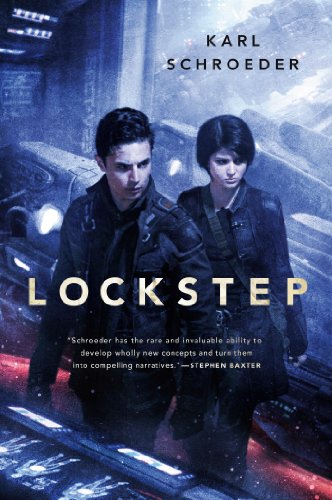
In the Lockstep world, whole planet’s sleep for decades only to wake for a month at a time, but all in lockstep with other worlds on their frequency. Another brilliant idea from Karl Schroeder.
Review by Ernest Lilley
Originally published in SFRevu: March 2014, Lockstep
When Toby McGoingal wakes fourteen thousand years into the future, having survived meteor impact while in cryo-suspension, he has a number of surprises waiting for him. For one thing, he’s the heir to everything his family owned, which happens to be an empire that spans star systems as well as centuries. On the other hand, he’d have to dispose his brother, who rules over all of it, and has for the last forty years.
Toby’s not the only one who’s been in suspension. Author Karl Schroeder’s come up with a brilliant new twist on the theme of suspended animation in science fiction. In Lockstep, an entire civilization goes into suspension for thirty years to every month spent awake. There are a number of reasons why, from enabling interstellar commerce to storing up energy and resources on marginal worlds, but the result is that a vast civilization has grown from the small seed his family planted, despite the family only experiencing a small amount of time.
That Toby is back isn’t good news for his brother Peter, or his sister Evelyne, who’ve used his disappearance as the core of a legend that’s made them powerful. If news of his return gets out, it could upset everything. Better he was dead than that news of his return should get out, and unfortunately for Toby, the group that found him knows that taking care of this problem for his brother is an opportunity not to be missed.
Fortunately, Toby falls in with a group of rebels whose planet was being punished for wanting to change its Lockstep frequency, Toby has to find a way out of myth and back into the world that doesn’t destroy a civilization that spans light years. But Toby’s only seventeen, and numberswiki.com
his younger brother and sister are now middle aged and vastly powerful. He’s not looking to ursurp anyone, but if he’s going to survive, he may have to.
Fortunately for him, he knows the game his siblings are playing, in this case, literally. When Peter was young and traumatized by a kidnapping on Earth, Toby built a virtual world to help him connect to the real one, a world where he couldn’t be hurt. Though that was a lifetime ago for Peter, it was only yesterday for Toby, and while there’s a lot about this world he doesn’t get, what he does understand is that it’s based on the game they created.
This is a coming of age story in which the main character spends a lot of time not quite waking up to the reality he’s now living in. Given that he’s 14k/40 years out of step, we probably shouldn’t be too hard on him, but it isn’t until two thirds of the way through the book that he switches over from confused adolescent to man of action. When he does though, things take off.
The confluence of improbabilities that surround Toby made this less enjoyable for me than other titles by the author. Others, like Permanence, which shares a number of common themes to this book; A family in a position of influence and an inconvenient sibling that needs to be gotten rid of. Or Sun of Suns, the first book in the swashbuckling Virga series set in a zero g bubble with an artificial sun and a field that prevents electronics from working. All of the author’s worlds are equally fantastic and well thought out. While the world in Lockstep is true to the author’s form, his characters are simpler than usual, and the premise requires considerably more willingness to go along with the plot.